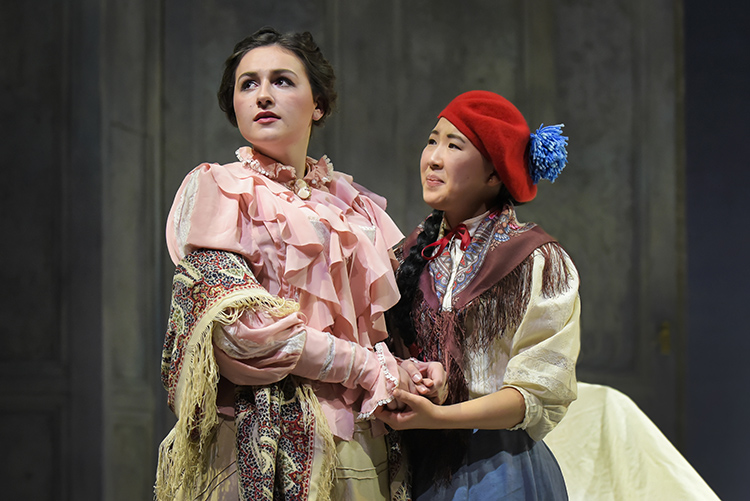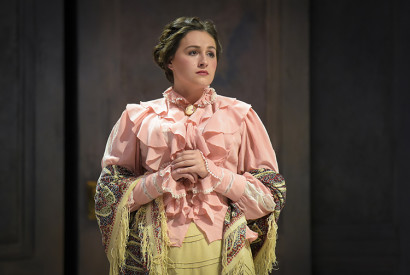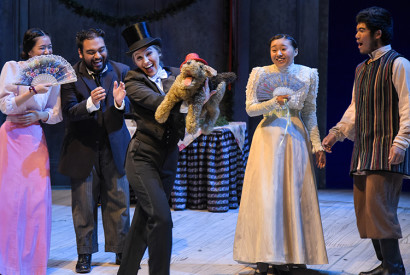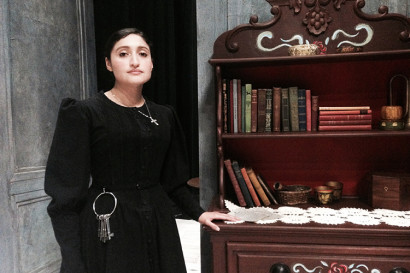Looking at wealth and poverty, through Chekhov’s eyes
Student actors will be center stage in UC Berkeley's Department of Theater, Dance and Performance Studies' The Cherry Orchard, the final work by Russian playwright Anton Chekhov, which tells the story of one family's plight during the fall of the Russian aristocracy.

October 21, 2015
Student actors will be center stage in UC Berkeley’s Department of Theater, Dance and Performance Studies’ The Cherry Orchard, Russian playwright Anton Chekhov’s final work, which tells the story of one family’s plight during the fall of the Russian aristocracy.

Jessica Slaght plays Lyubov Ranevskaya, a once-wealthy Russian aristocrat who returns home to find her family’s estate at risk of being auctioned. (Photo by Alessandra Mello)
Set at the start of the 20th century as Russia rolls toward revolution, The Cherry Orchard introduces the widowed Lyubov Ranevskaya, a once-wealthy land owner who returns to her family’s home after years of living abroad to find her estate and its cherry orchard at risk of being auctioned.
Jessica Slaght, a senior and double-major in theater and performance studies and media studies, plays Lyubov in the play. She says it was a treat to play such a complex character who, though good-natured, remains at odds with the shifting social climate in Russia. “She was raised without a sense of the value of money or possessions,” says Slaght, “so she is extremely frivolous and completely in denial of the magnitude of her debt.”

The Cherry Orchard — the final play by Anton Chekhov — is set in the early 1900s as Russia moved toward revolution. (Photo by Alessandra Mello)
Directed by Lura Dolas, a veteran actor and longtime lecturer at Berkeley, the play explores themes that are utterly human regardless of time or place. “You can just feel the humanity in all the characters,” says Dolas. “With all our foibles, triumphs, fears and hopes.”
It also speaks to social issues that are relevant today, she says, especially the gaping disparity between the rich and poor and the reliance on cheap labor to keep the wealthy on top. In the play, serfs — or servants — are always working and moving throughout the house, keeping the house running for the once upper-class family. “The world has changed since the play was written,” says Dolas, “yet much is the same.”
The costumes were created by B. Modern, a Santa Cruz-based designer who studied dramatic arts and costume design at UC Berkeley in the 1970s, and by students and staff in the department. While Lyubov wears flashy, lavish outfits, other characters wear practical clothes, signifying their place in the household and role in society.

Isabel Cruz plays Lyubov’s adopted daughter, Varya, who has been taking care of the estate while her mother was away. (UC Berkeley photo by Anne Brice)
Isabel Cruz, a senior majoring in theater and performance studies, plays Lyubov’s oldest daughter, Varya, who managed the estate while her adoptive mother was away. “Varya is covered up in a black dress with little adornment, and dangling at her hips are her keys,” says Cruz. “She has chosen to live a simple life. She is the head of the household, the housekeeper and the homemaker.”
“It’s a play about love and hope and fear and denial,” says Dolas. “Giving up treasured beliefs and ways of life and looking to the future, rushing headlong into it. And looking back.”
The Cherry Orchard opens Friday, Oct. 23, and continues through Sunday, Nov. 1, at the Zellerbach Playhouse on campus. Tickets are $13-$20 and can be purchased online or at the door. The show runs two hours and 15 minutes with an intermission.
To learn more about The Cherry Orchard, visit the Department of Theater, Dance, and Performance Studies website.